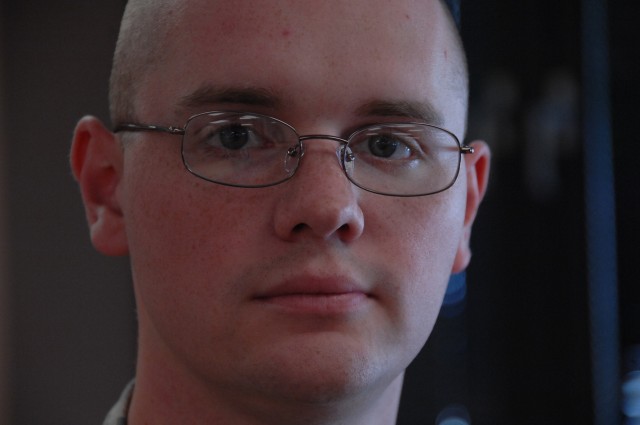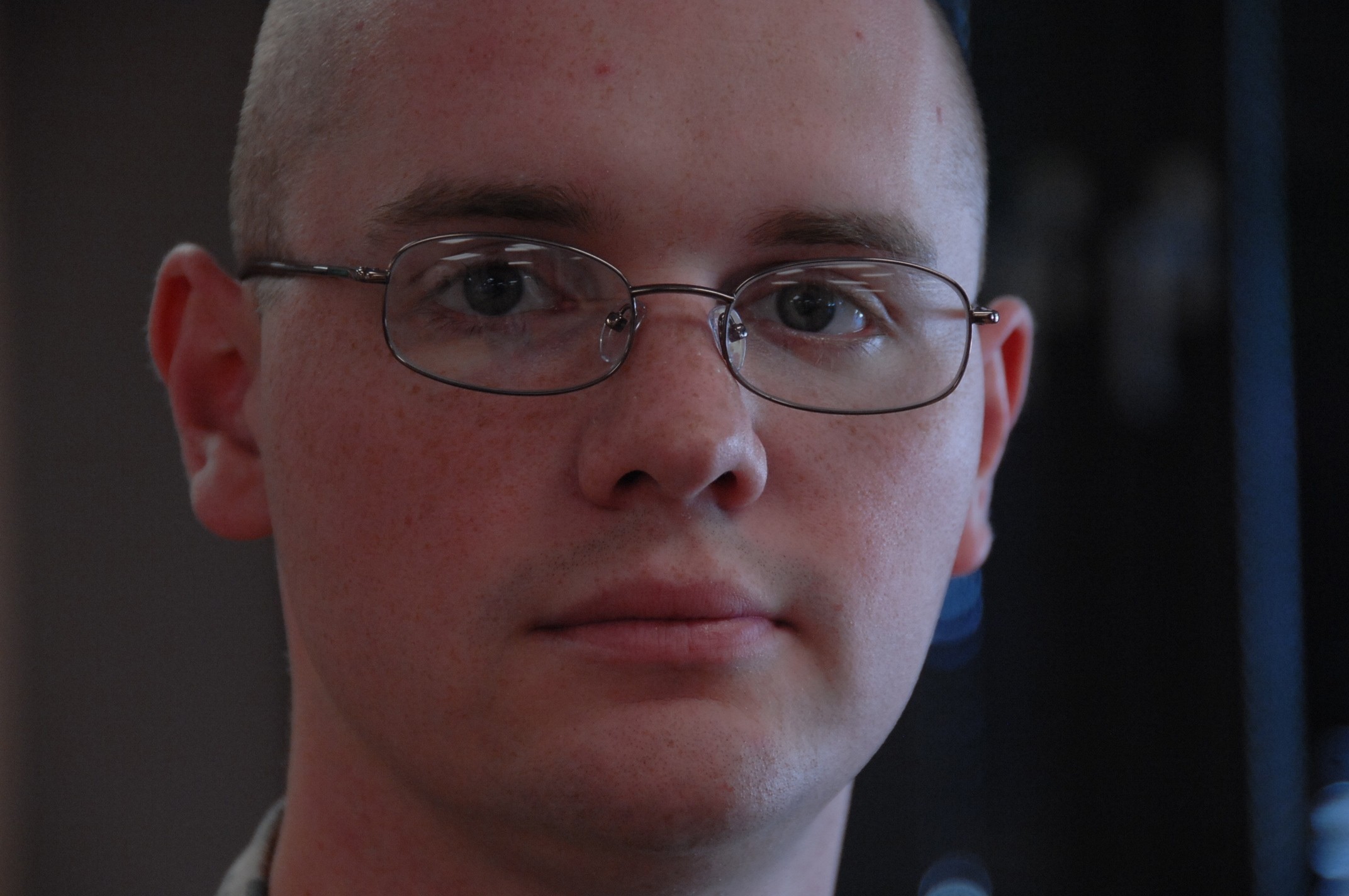Fort Lee, Va. (Sept. 4, 2008) -- Spc. Ryan Martinette, a combat medic, reeled from the blast of an improvised explosive device at almost point-blank range. Regaining his senses, he picked up his medic's bag but found it drenched with blood.
His own.
That was two years ago on the trash and debris-strewn streets of Baghdad, Iraq, where he and his unit happened upon a wounded Iraqi civilian and endured some rather anxious moments thereafter. The Medical Department Activity Soldier earned a Bronze Star with Valor for his actions in the summer of 2006. He was presented with it during a ceremony held Aug. 22 at Kenner Army Health Clinic, Fort Lee, Va., where he works.
Maj. Gen. James E. Chambers, Combined Arms Support Command and Fort Lee commanding general, was on hand to present the award. He said combat medics put themselves in great danger to care for fellow Soldiers, and their value is often understated.
"Until you go to war, you don't know or appreciate who or what a medic is," Chambers said.
Martinette wanted to be a medic and wanted to go to war. He joined four years ago, knowing full well the country was engaged in a bloody terrorist conflict and the sacrifices he would have to make if he ever found himself on the battlefield.
"When you join in a time of war, you understand the risks of that war," the 23-year-old said. "I was ready to go because I was ready to make a difference ... That was my goal - to make sure that, when we did go, the men I was responsible for wouldn't die."
But prior to his deployment, Martinette wasn't always willing to give something of himself. The Virginia Beach native subscribed to a "me first" mentality, was self-absorbed and only concerned with endeavors that benefited him.
"I was immature when I came into the military," he said. "I thought that I was always going to get what I wanted. It was all about me."
Martinette was posted to Fort Hood, Texas, in 2003. In December 2005, he deployed to Iraq with Company A, 1st Battalion, 12th Infantry, 4th Infantry Division. His duties were to provide health care to the infantrymen, wherever missions may take them. That essentially meant that he was a foot Soldier with a stethoscope.
"When they march, we march," said Martinette, one of five medics in the company of about 130 Soldiers.
Co. A was assigned to the Green Zone, an area of Baghdad that headquartered the coalition provisional authority. The unit's primary mission was to support cordon-and-search and patrol operations. On the morning of Aug. 18, 2006, the unit was patrolling an area of the city when members of a U.S. engineer unit were hit by an IED.
"They needed help," recalled Martinette. "They didn't have enough support to cordon off the area to try to find out who had detonated the IED. We responded to their call for help."
When Martinette's unit, mounted in Bradley Fighting Vehicles, had arrived on the scene, there were a number of concussion injuries. The most serious of the casualties, an Iraqi civilian, lay on his back in the middle of the street, bleeding from his nose and ears, said Martinette.
"They dropped the ramp of the Bradley and said, 'Go and get them,'" he said, "no different than any other time that had occurred."
The infantrymen cleared the site and Martinette approached the man, who looked to be about 50 years old.
"He was very incoherent from the blast, and he reached down into his pants," said Martinette, who was at that point standing over the victim. "We thought that he had a weapon or detonation device."
It was a moment that underscored the various dangers U.S. military personnel face everyday in combat zones, oftentimes with deadly results. In this case, the Iraqi's action was harmless; the victim removed from his groin area a bag full of U.S. and Iraqi currency.
"He looked at me, handed the money to me and said something (in Arabic)," said Martinette. "I found out later (through the on-scene interpreter) that he'd rather I have the money than the insurgents ...."
Martinette, still standing over the victim along with several over Soldiers, began a movement to kneel next to the man.
"As soon as I bent down to grab the casualty, the bomb detonated," he said.
It was a scene that has been played out hundreds of times over the course of the war: a felled victim, the gathering of those who arrive to assist and the detonation of an IED. The practice is designed to maim, kill, humiliate and devastate.
The IED explosion on this day destroyed whatever measure of security and calm there was. It occurred less than five feet away from Martinette and blew pieces of shrapnel straight through his arm. Furthermore, it severely injured a Soldier standing directly behind him and would've done the same to him, had he not moved to bend. The word 'surreal' doesn't do justice to the moment, said Martinette.
"It was like time slowed down, where everything happened very, very slowly and all of sudden, things happened very, very fast," he said, noting he did not know he had been injured.
Martinette was in a state of disorientation from the blast. He quickly gathered himself, though, and through an infusion of adrenaline and sense of duty, he instinctively moved to care for his comrades. To that end, he picked up his medic's bag but found it stained with his blood - about a pint and a half of it, he said.
"That's when I knew I was hit," said Martinette, noting he still didn't feel the pain.
Another medic who was treating victims forcefully directed Martinette to treat himself. He reluctantly did so, cutting off his sleeve and noticing two "quarter-sized holes" in his arm, he said.
Martinette received no nerve damage in his arm.
"It couldn't have taken a more perfect path to cause the least amount of damage," he said, "just under the nerves and just above the bone."
After the peak in action on the scene, Martinette and the other victims were evacuated from the area to hospitals.
In the aftermath, the perpetrators were never found; seven or eight Soldiers were injured in the incident; and the Iraqi civilian sustained more injuries in the second blast but lived.
"Nobody died that day, miraculously," said Martinette.
Indeed, Martinette can count - no tally - his blessings. This wasn't the first time he had encountered an IED explosion.
"This was the first one I went through without being in a vehicle," he said, listing several encounters.
With each IED incident and each day he survived in Iraq, Martinette grew into a person markedly different than the one who was likely to ask, 'What can my country do for me'' rather than 'What can I do for my country''"
Futhermore, Martinette's blossoming relationship with his wife, Joanna, brought perspective to why he was a changed man.
"My wife is the most selfless person that I have ever met," said Martinette. "She brought a compassionate side to a Soldier who had to be tough all the time."
That compassion pushed Martinette to thinking that the war and the people involved in it are bigger than himself or any selfish want he could ever have.
"There's so much more to life than money, nice cars and fancy things," he said. "It's all about people."
Martinette reenlisted during his medal presentation ceremony and thinks he will serve 20 years in the Army. He said time spent in Iraq was priceless and serving as a medic is the best way to create a legacy of giving back to his fellow man.
"The experience lets you know that your day (to die) can come and what you do on your last day is what people are going to remember. I would hope that on my last day, I was doing something really, really good for somebody," he said.


Social Sharing